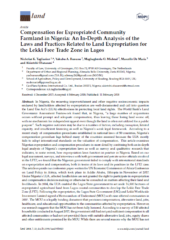
In Nigeria, the recurring impoverishment and other negative socioeconomic impacts endured by landholders affected by expropriation are well-documented and call into question the Land Use Act’s (LUA) effectiveness in protecting local land rights.
The World Bank’s Land Governance Assessment Framework found that, in Nigeria, “a large number of acquisitions occurs without prompt and adequate compensation, thus leaving those losing land worse off, with no mechanism for independent appeal even though the land is often not utilized for a public purpose”. Such negative outcomes may be due to a number of factors, including corruption, limited capacity, and insufficient financing as well as Nigeria’s weak legal framework.
According to a recent study of compensation procedures established in national laws of 50 countries, Nigeria’s compensation procedure lags behind many of the countries assessed because the LUA mostly fails to adopt international standards on the valuation of compensation.
This article examines Nigerian expropriation and compensation procedures in more detail by combining both an in-depth legal analysis of Nigeria’s expropriation laws as well as survey and qualitative research that indicates, to some extent, how expropriation laws function in practice in Nigeria. Based on our legal assessment, surveys, and interviews with both government and private sector officials involved in the LFTZ, we found that the Nigerian government failed to comply with international standards on expropriation and compensation, both in terms of its laws and its practices in the LFTZ case.

Rejoignez-nous sur
LinkedIn X Facebook